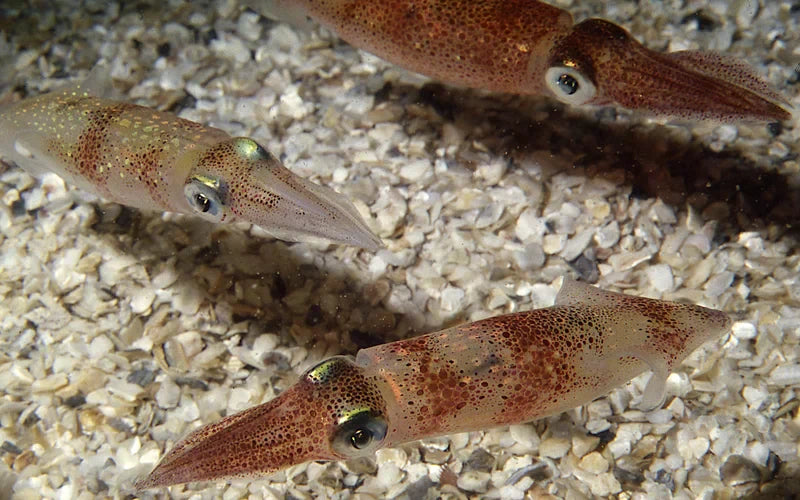
Is Squid is the Purest Protein Source in Existence?
Share
The FDA recommends you have at least three servings of seafood per week, given all the research that seafood consumption correlates with positive health outcomes. This is particularly true for children – for whom fish is a fantastic source of Omega-3s (DHA and EPA), Iron, Iodine, Choline, all of which are critical for early childhood brain development. But we also see a lot of news coverage about how (like with any protein source), we need to be selective about where we’re getting it – species, fishery location, farmed vs. wild-caught – they all matter. So we wanted to talk about why we think squid is one of the best protein choices you’ll find out there from a nutritional standpoint.
Squid is a complete protein that’s highly bioavailable
Not all proteins are created equal. The PDCAAS of the protein captures the “completeness” of its amino acids in terms of its consumption by the human body. The PDCAAS for wheat protein, for example, is somewhere around 0.24, indicating that if you eat 10 grams of protein from wheat, it’s the same as if your body is eating 2.4g of protein from a more balanced source, like eggs, or squid! We had the amino acid profile of the squid tested [results here] and it's higher than beef or chicken!
In addition to PDCAAS, we also need to consider if there are any anti-nutrients that will prevent you from absorbing all the protein contained in a given food (for example, soy has known chemical compounds that prevent the uptake of protein). Squid is fortunately free of any of these compounds, and in fact is considered one of the most bioavailable protein sources on the planet
Rich in Omega3s, Collagen, Selenium, Iron
There’s an extensive catalogue of research at this point showing how critical Omega3 fatty acids are to heart and brain health (and while seeds like flax and chia, and nuts like walnuts, do contain omega3s, they just contain ALA, which is about 100x harder for your body to use than the DHA and EPA that only come from ocean plants and animals).
But omega3s aren’t just good for the heart and brain, recent research also showed they can help athletes increase their muscle mass and boost the cardiometabolic health outcomes compared with exercise alone.
In addition, squid is a rich natural source of collagen, which recently has seen huge demand for its wide ranging effects on joint, nail, and skin health. A bag of our jerky has a whopping 12 grams! (see our amino testing here)
Finally, squid is also an excellent source of Iron – critical for pescatarians who avoid land meats – and a boatload of trace minerals like Selenium, a potent antioxidant.
Squid, like all crustaceans, is a significant source of dietary cholesterol -- but recently the American Heart Association reversed decades of orthodoxy and declared that dietary cholesterol is not bad for you.
Does “Wild caught” matter?
Wild-caught fish is simply more nutritious than farmed fish. Because it’s eating a natural diet (our squid mostly eat other wild small “forage” fish), they contain high amounts of omega3 Fatty acids like DHA and EPA (we did a test). Farmed fish eat a diet that’s normally high in omega6-heavy soy and other grains, that themselves are high in pro-inflammatory omega6s, not to mention pesticides and fertilizers that are used to grow them. All this is passed on to us consumers through the nutritional profile of the farmed fish itself.
In addition, because farmed fish (similar to intensive confined feedlot operations on land) are raised in close quarters and are not being fed a natural diet, they’re much more susceptible to diseases like sea lice. As a result, many farmed fish are fed a constant stream of prophylactic antibiotics and other chemical feed additives like enzymes and immunostimulants, which are then passed on to us when we eat them.
Low in Mercury and other contaminants
Farmed fish suffers from a number of contaminant and toxicological issues as well which we covered in another blog post. But it’s not just farmed fish. Most people know that Tuna contains large amounts of methylmercury and that the FDA recommends consumers eat lower on the food chain and focus on fish just like squid, that are small, have a short life cycle, and live in uncontaminated ecosystems. One of the reasons we were so excited about squid is the low levels across the board of the chemicals of concern for other seafoods.
Thanks for reading. Have any thoughts, objections, omens? Email us at portents@thehermit.com . We love hearing from similarly thoughtful and informed protein enthusiasts!





